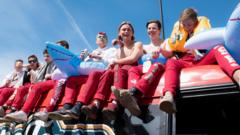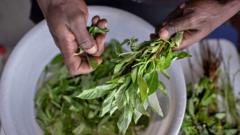In Norway, the festive spirit of school-leavers, celebrated through the tradition of "russ," is at risk of overshadowing the purpose of education. Traditionally marked by vibrant red overalls and lively parties leading up to Norway's national day on May 17, this custom has recently spiraled into concern as students begin celebrating weeks before final exams are concluded.
Selma Jenvin-Steinsvag, 18, and her peer Aksel are gearing up for their celebrations, reminiscent of countless students before them. However, the widespread use of "russebuss," or party buses, has invoked scrutiny from parents and policymakers. "We go out every night for a month, we get drunk, we're partying with our friends and it's just fun!" shares Edvard Aanestad, 19, highlighting the hedonistic nature of the celebrations that many indulge in.
With considerable financial investments typically involved in renting and outfitting these buses, many students find themselves in substantial debt. Each night, loud music blaring from the buses fuels rampant partying, raising alarms about heavy drinking, drug use, and decreased sleep among the youth. Additionally, many students feel excluded from the celebrations due to the financial burden.
Prime Minister Jonas Gahr Støre acknowledged that while he cherished his own graduation, he believes the party bus scene has "spun out of control." Educators and parents are echoing his sentiments, voicing concerns over the adverse effects of the celebration culture on younger adolescents, as the echo of its impact extends down to middle school students.
Solveig Haukenes Aase, a concerned parent, articulated the shifting sentiment among educators, who now acknowledge the detrimental effects of the russe culture on the school environment. "It’s now widely acknowledged that the new russe culture has a huge impact on the school environment," she noted, exemplifying a broader cultural shift.
Norway's Minister of Education, Kari Nessa Nordtun, emphasized the intertwining of the graduation celebrations with exam periods as problematic for students' focus and performance. She outlines a vision for restructured celebrations to address social exclusion and economic stress on families, urging a shift to post-exam festivities in the upcoming year.
Historically, the tradition is rooted in elite school culture dating back to the 1980s but has since transformed into a nationwide phenomenon. The increasing commercialization of the traditions raises further concerns, as many groups finance their extravagance through creative fundraising endeavors, often leading to even greater financial strain.
The push for a more secure environment for students prompted discussions about safety regulations governing the buses. Current proposals aim to ban unsafe seating arrangements, to which many students, like Edvard, express dissent, arguing it will only exacerbate issues of inclusivity.
As conversations about the future of russe culture unfold, many students passionately defend their tradition, highlighting the careful planning and sacrifices they've made for a memorable celebration. The government and educational stakeholders must navigate a delicate balance between maintaining these cherished customs and ensuring the mental, emotional, and social well-being of Norway's youth during this pivotal transition.
Selma Jenvin-Steinsvag, 18, and her peer Aksel are gearing up for their celebrations, reminiscent of countless students before them. However, the widespread use of "russebuss," or party buses, has invoked scrutiny from parents and policymakers. "We go out every night for a month, we get drunk, we're partying with our friends and it's just fun!" shares Edvard Aanestad, 19, highlighting the hedonistic nature of the celebrations that many indulge in.
With considerable financial investments typically involved in renting and outfitting these buses, many students find themselves in substantial debt. Each night, loud music blaring from the buses fuels rampant partying, raising alarms about heavy drinking, drug use, and decreased sleep among the youth. Additionally, many students feel excluded from the celebrations due to the financial burden.
Prime Minister Jonas Gahr Støre acknowledged that while he cherished his own graduation, he believes the party bus scene has "spun out of control." Educators and parents are echoing his sentiments, voicing concerns over the adverse effects of the celebration culture on younger adolescents, as the echo of its impact extends down to middle school students.
Solveig Haukenes Aase, a concerned parent, articulated the shifting sentiment among educators, who now acknowledge the detrimental effects of the russe culture on the school environment. "It’s now widely acknowledged that the new russe culture has a huge impact on the school environment," she noted, exemplifying a broader cultural shift.
Norway's Minister of Education, Kari Nessa Nordtun, emphasized the intertwining of the graduation celebrations with exam periods as problematic for students' focus and performance. She outlines a vision for restructured celebrations to address social exclusion and economic stress on families, urging a shift to post-exam festivities in the upcoming year.
Historically, the tradition is rooted in elite school culture dating back to the 1980s but has since transformed into a nationwide phenomenon. The increasing commercialization of the traditions raises further concerns, as many groups finance their extravagance through creative fundraising endeavors, often leading to even greater financial strain.
The push for a more secure environment for students prompted discussions about safety regulations governing the buses. Current proposals aim to ban unsafe seating arrangements, to which many students, like Edvard, express dissent, arguing it will only exacerbate issues of inclusivity.
As conversations about the future of russe culture unfold, many students passionately defend their tradition, highlighting the careful planning and sacrifices they've made for a memorable celebration. The government and educational stakeholders must navigate a delicate balance between maintaining these cherished customs and ensuring the mental, emotional, and social well-being of Norway's youth during this pivotal transition.



















